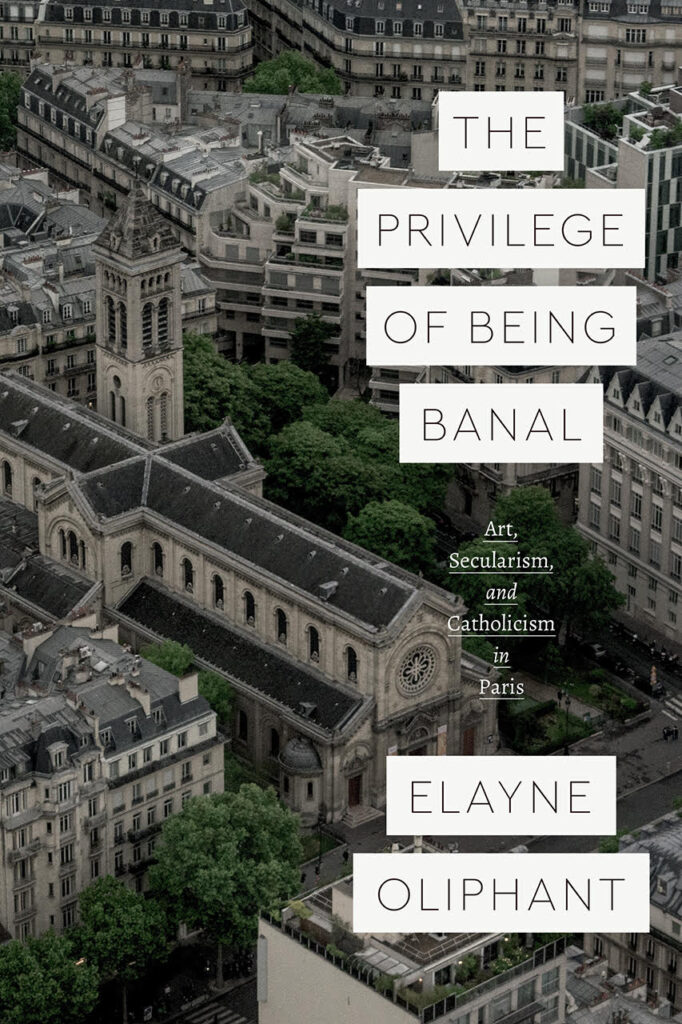by Alex Kreger
Elayne Oliphant, The Privilege of Being Banal (Chicago: University of Chicago Press, 2021; 280 pages; $30.00).

Elayne Oliphant’s The Privilege of Being Banal is an incisive study of how human-material relations reproduce Catholic privilege in contemporary France. Drawing on two years of ethnographic fieldwork in Paris at the Collège des Bernardins, a medieval Cistercian monastery-turned-Catholic cultural center, Oliphant argues that Catholic materiality affords aesthetic grounding for the legitimization of persistent inequalities which continue to structure French society.
She details how the actions of an array of actors including Collège employees, artists, museum-goers, and politicians combine to render Catholic signs a banal, or self-evident part of French and European culture. In contrast with the marked hypervisibility of the Islamic veil, Catholic forms are highly flexible and mobile in their ability to fade into the background or break into the foreground of the French public sphere—hence their privileged status.
Oliphant’s analysis highlights the multiple, ongoing efforts necessary to curate (a particularly apt term, given her ethnographic context) narratives of Catholic continuity in secular modernity. Curation takes many forms and recurs at multiple scales—both inside the Collège, in discourses of renaissance around the Collège’s reopening or decisions about programming and self-branding; and outside, in the public statements of politicians like President Macron and religious figures like the charismatic Cardinal Lustiger, former Archbishop of Paris. As a Jewish-born convert to Catholicism who, in refusing to renounce his Judaism, rebranded his conversion as a “crystallization,” Lustiger embodied the ideal of catholaïcité—a continuity narrative that presents French secularism as always already Catholic. Whereas Judaism is domesticated within catholaïcité, Islam is rendered indelibly other. Oliphant shows this in her analysis of how the Collège used the presence of a veiled female Muslim scholar on one of its debate programs to promote an image of “opening” while reinforcing the exclusion of Islam and Muslims from its sociocultural project.
The book’s ethnographic core focuses on the first four contemporary art exhibits staged at the Collège between 2008 and 2010. Oliphant’s employment by the Collège as a mediator, or facilitator for visitors’ encounters with the exhibits, enabled her to note the interactional patterns which emerged over the course of repeated, brief exchanges. This led her to classify the visitors into three publics—contemporary, classical, and spiritual. Oliphant notes that these publics’ art-viewing habits tended to overlap with three regimes of artistic value as theorized by Jacques Rancière: while the contemporary public evaluated exhibits according to internal criteria such as the artists’ usage of techniques and materials (aesthetic regime), the classical public held in common a focus on recognizing and appreciating the semblance of representational figures (poetic regime), and the spiritual public typically judged exhibits according to external criteria—their use and/or “truth”-value from a Christian, ethical standpoint (ethical regime). Through use of these ideal-types, Oliphant offers a framework for thinking about materiality in religious studies outside the secular/religious binary.
Emerging throughout Oliphant’s ethnography is a tension between the Collège’s efforts to normalize Catholicism as part of a purportedly universal cultural heritage, and the anxiety some Catholics experience regarding the possible erosion of Catholicism’s distinction as revealed religion. This distinction is what comes through most clearly in the ethical modes of viewing Oliphant describes, and in Catholic actors’ acts of evangelization which persist in uneasy give-and-take with the Collège’s work of normalization. By framing Catholicism as part of universal cultural heritage, the College partially suspends the monotheistic doctrine of exclusivity of religious truth claims, or what Jan Assmann refers to as the Mosaic distinction. This immanentization of Catholicism—bolstered by the aesthetic regime of art-viewing encouraged by the Collège—is efficacious insofar as it promises the Catholic Church better worldly fortunes in secular modernity (if not, perhaps, better prospects in the afterlife).
The Privilege of Being Banal is a timely contribution to current discussions around secularism, religion and/as media, and the relationship between religion and privilege in religious studies, anthropology, and cognate disciplines. Its rich ethnography is a pleasure to read and its theoretical engagements wide-ranging. Both are skillfully integrated in service of offering a more nuanced approach to understanding materiality in the study of religion.
Alex Kreger is a Ph.D. Candidate in Religious Studies at the University of Texas at Austin. His research focuses on the role of music and language in contemporary Alevi religious reform in Turkey and Europe.


